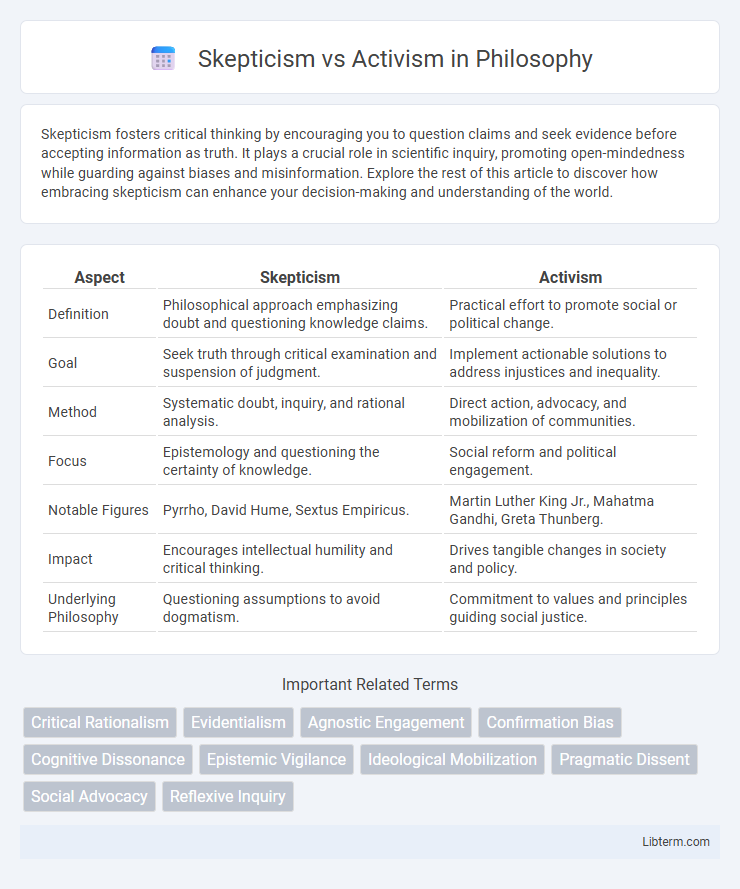Skepticism fosters critical thinking by encouraging you to question claims and seek evidence before accepting information as truth. It plays a crucial role in scientific inquiry, promoting open-mindedness while guarding against biases and misinformation. Explore the rest of this article to discover how embracing skepticism can enhance your decision-making and understanding of the world.
Table of Comparison
| Aspect | Skepticism | Activism |
|---|---|---|
| Definition | Philosophical approach emphasizing doubt and questioning knowledge claims. | Practical effort to promote social or political change. |
| Goal | Seek truth through critical examination and suspension of judgment. | Implement actionable solutions to address injustices and inequality. |
| Method | Systematic doubt, inquiry, and rational analysis. | Direct action, advocacy, and mobilization of communities. |
| Focus | Epistemology and questioning the certainty of knowledge. | Social reform and political engagement. |
| Notable Figures | Pyrrho, David Hume, Sextus Empiricus. | Martin Luther King Jr., Mahatma Gandhi, Greta Thunberg. |
| Impact | Encourages intellectual humility and critical thinking. | Drives tangible changes in society and policy. |
| Underlying Philosophy | Questioning assumptions to avoid dogmatism. | Commitment to values and principles guiding social justice. |
Understanding Skepticism: Core Principles
Skepticism centers on questioning assumptions and demanding empirical evidence before accepting claims, emphasizing critical thinking and intellectual humility. Core principles include the suspension of judgment until sufficient proof is available and openness to revising beliefs in light of new, credible information. This approach fosters rigorous analysis and protects against cognitive biases, distinguishing skepticism from mere cynicism or rejectionism.
The Essence of Activism: Key Foundations
Activism centers on committed efforts to drive social, political, or environmental change through organized actions, community engagement, and advocacy. Fundamental to activism are principles of collective empowerment, persistent mobilization, and strategic use of resources to influence public policy and societal norms. Understanding activism's essence involves recognizing its proactive stance in confronting injustices and fostering transformative progress.
Historical Perspectives: Skepticism and Activism through Time
Historical perspectives reveal skepticism as a critical mindset questioning established norms, evident in ancient Greek philosophy and Enlightenment thought. Activism, driven by collective action and social movements, has shaped political revolutions from the French Revolution to the Civil Rights Movement in the 20th century. The dynamic interplay between skepticism and activism has continuously fueled societal progress and reform across different eras.
Key Differences Between Skepticism and Activism
Skepticism emphasizes critical thinking, questioning assumptions, and requiring evidence before accepting claims, fostering careful analysis and doubt. Activism centers on taking direct action to promote social or political change, often driven by passion and urgency to address perceived injustices. The key difference lies in skepticism's focus on inquiry and evaluation versus activism's focus on proactive engagement and advocacy.
Intersections: Where Skepticism Meets Activism
Skepticism and activism intersect in the critical examination of information that drives social change, empowering activists to challenge misinformation and advocate for evidence-based policies. This intersection promotes informed activism, where skepticism fosters critical thinking and accountability, strengthening the credibility of social movements. By merging skeptical inquiry with passionate advocacy, activists can create more effective strategies rooted in verifiable facts and rational discourse.
The Role of Critical Thinking in Social Movements
Critical thinking serves as a foundational element in differentiating skepticism from activism within social movements by promoting evidence-based analysis and questioning of prevailing narratives. Activists employ critical thinking to evaluate the legitimacy of social issues and develop strategic interventions that drive effective change. This logical scrutiny ensures that actions are well-informed, maximizing impact and minimizing the influence of misinformation or emotional bias in advocacy efforts.
Potential Conflicts: When Skepticism Challenges Activism
Skepticism challenges activism by questioning the validity of proposed solutions, potentially slowing down urgent movements aimed at social or environmental change. Conflicts arise when skeptics demand extensive evidence or highlight uncertainties, causing delays in policy implementation despite activist calls for immediate action. This tension between critical inquiry and proactive engagement often requires balancing rigorous analysis with timely, impactful interventions.
Benefits of Balancing Skepticism and Activism
Balancing skepticism and activism fosters informed decision-making by encouraging critical evaluation of information while driving passionate efforts for change. This synergy minimizes impulsive actions fueled by misinformation and enhances the credibility and effectiveness of social campaigns. Integrating skepticism with activism promotes thoughtful advocacy that addresses root causes and supports sustainable progress.
Real-World Examples: Skepticism and Activism in Action
Environmental skepticism often challenges the urgency of climate change policies, with figures like Bjorn Lomborg advocating for cost-effective solutions rather than immediate radical action. In contrast, activism is exemplified by Greta Thunberg's global climate strikes, mobilizing millions to demand swift governmental intervention. These real-world cases highlight how skepticism emphasizes questioning and analysis, while activism drives public engagement and policy change.
Toward Productive Dialogue: Bridging Skeptics and Activists
Building bridges between skeptics and activists requires fostering open, empathetic communication that acknowledges differing perspectives while seeking common ground. Emphasizing shared goals, such as social justice or environmental sustainability, can transform adversarial interactions into collaborative problem-solving sessions. Tools like structured dialogues and conflict resolution frameworks promote mutual understanding and help integrate evidence-based reasoning with passionate advocacy.
Skepticism Infographic

 libterm.com
libterm.com